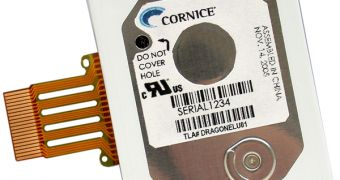Portable consumer electronics applications that need storage space have long since switched to NAND-Flash based devices, putting an end to the popular 1.8-inch miniature hard disk drives. Flash memory is more energy-efficient, offer faster access times and takes physical shocks better than the sinning platters.
The miniature HDD industry has gone short two of its most important 1.8-inch storage providers, Hitachi and Fujitsu. Both companies have called it quits in order to focus their business on the more promising NAND-Flash storage devices. This move left Toshiba to supply the whole 1.8-inch HDD market.
Those who are nostalgic about the times when a few dollars could buy a 40 GB drive in a CF II form factor will surely be interested in the offer below. Showa Denko, one of the world's leading disk manufacturers, announced that it has started large shipments of 40 GB 1.3" disks, which are small enough to fit into micro HDDs.
The increased storage capacity is the result of the company's having perfected the perpendicular magnetic recording technology, that is widely used within the 1.8-inch, 2.5-inch and 3.5-inch HDDs. According to the manufacturer, these devices will feature lower power consumption requirements and higher resistance to shocks than the 1.8-inch models.
You may wonder why go back to spinning platters when there are similar-capacity flash drives for personal use. The problem is that the flash memory remains fairly expensive in high-capacity ranges, and, sometimes, a 16 GB USB stick would be priced up to $200, depending on the model and its manufacturer. For this price, you can get even two 40 GB miniature hard-disk drives without being affected by their slightly increased size as compared to a flash drive.
Showa Denko did not specify when the disks will become available through the retailers' network of stores, but said that it has readied the first "commercial shipments".

 14 DAY TRIAL //
14 DAY TRIAL //